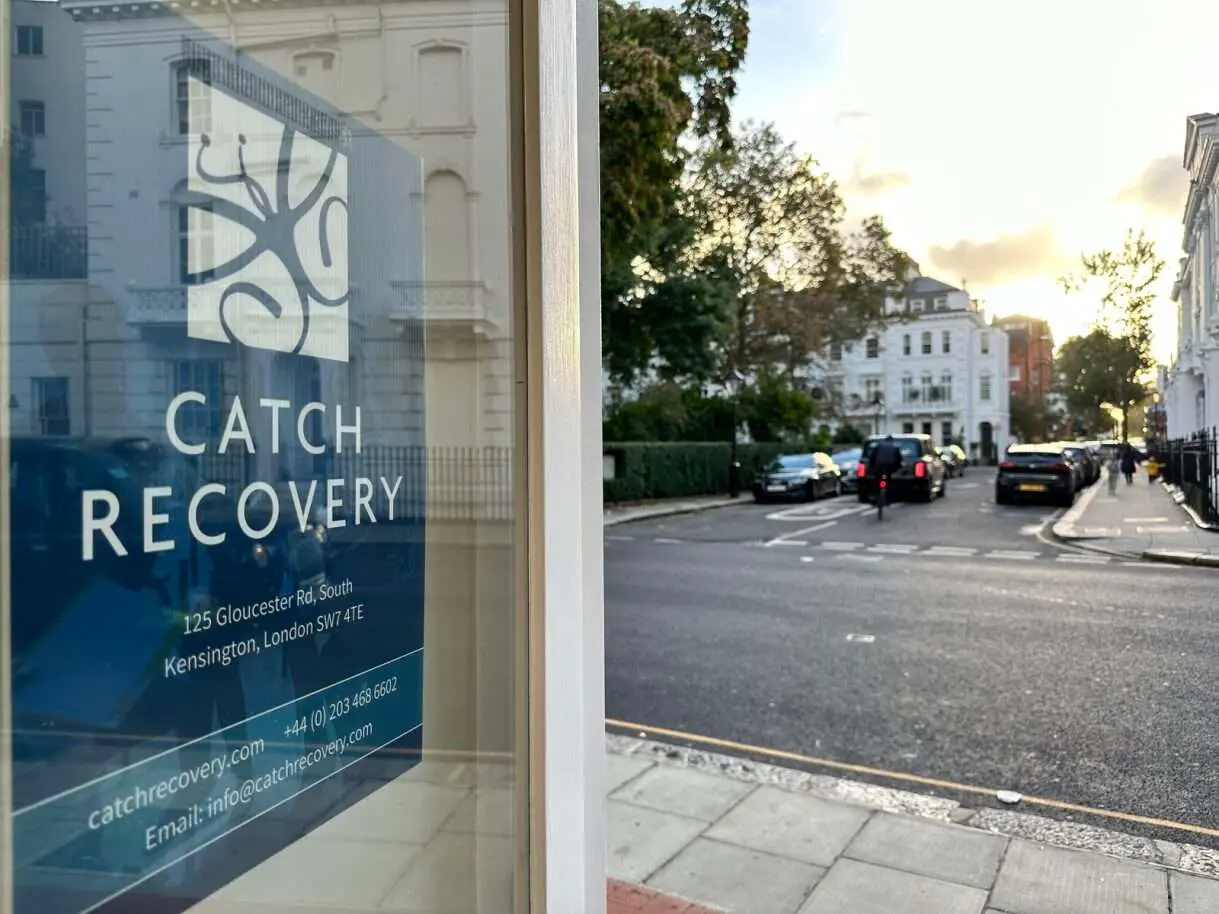
Concerned about alcohol?
Table of Contents
What is Alcohol Addiction?
Alcohol addiction is a mental illness characterised by the compulsive need to drink despite the consequences. The DSM-5 (Diagnostic and Statistical Manual of Mental Disorders, Fifth Edition) refers to alcohol addiction as Alcohol Use Disorder (AUD) and defines it as “a problematic pattern of alcohol use leading to clinically significant impairment or distress.” 1
Chronic alcohol misuse can lead to serious mental and physical health problems including liver disease, cardiovascular problems, cognitive impairments and a weakened immune system. As well as the physical impact on your health, alcohol use disorder can affect relationships, work or school performance and overall quality of life. Eventually, people find themselves stuck in a vicious cycle, using alcohol to cope with the problems that drinking has caused. 2
“No one chooses to become dependent on alcohol, and it’s not a matter of moral weakness. For many, the signs of addiction are subtle and gradually develop over time. Alcohol can become so ingrained in a person’s daily life that they rely on it for every occasion, using it as a way to feel ‘normal’.“
Jamie Giles, Director of Outpatient Services, Castle Health.

Alcohol Addiction, Dependence and Misuse
The terms alcoholism, alcohol dependence and alcohol misuse are often used interchangeably but they each describe different aspects or levels of alcohol use disorder. ‘Alcoholism’ is a somewhat outdated term that generally refers to a severe form of alcohol dependence where there is a strong and often uncontrollable craving for alcohol accompanied by physical and psychological addiction.
Alcohol dependence means the body needs alcohol to feel normal, which may include tolerance (needing more alcohol to get the same effect) and withdrawal symptoms when not drinking. Alcohol misuse describes a pattern of drinking that causes harm, such as neglecting responsibilities, legal problems or drinking in dangerous situations, however, this doesn’t necessarily indicate physical dependence.
Alcohol addiction is different from binge drinking, which involves consuming large amounts of alcohol in a short space of time, often to get drunk. Not all binge drinkers will develop an alcohol use disorder, as it is more than just occasional heavy drinking.
One of the main characteristics of an alcohol use disorder is the presence of repeated and chronic patterns of alcohol misuse. This includes continuing to drink despite the negative outcomes, losing control over drinking and needing to drink every day to feel normal. Someone with an alcohol use disorder might drink heavily every evening to unwind even when it starts to affect their job, relationships or health, whereas a binge drinker might only drink heavily on weekends but not feel the need to drink during the week.
Who is at Risk?
Alcohol addiction can affect anyone, regardless of gender, age or background. However, some factors increase the risk of developing an alcohol use disorder. Knowing these risks may help identify those most at risk and encourage early intervention.
Genetic, Social and Environmental Factors
The causes of alcohol addiction are measured by genetic, environmental and sociological factors. Genetics play a big role but not everyone genetically vulnerable will develop a problem. Being exposed to alcohol at a young age and high levels of stress are environmental factors that can also contribute to the risk of developing alcohol use disorder.
Children of parents with alcohol use disorders are up to four times more likely to develop a problem.3 Research shows that children raised in households where alcohol misuse was prevalent are more likely to develop psychological and behavioural issues. Growing up in an unstable environment like this can lead to emotional distress and an increased likelihood of substance misuse in their own lives. Statistics show that nearly half of all people diagnosed with an alcohol use disorder have a close family member who also struggles with problem drinking.
People with pre-existing mental health conditions such as depression, including those with developmental disorders like autism and ADHD may be more likely to develop compulsive drinking patterns for various reasons.
Similarly, people who have experienced trauma of any kind, and those with PTSD are more likely to develop AUD as they are more likely to self-medicate to cope with co-occurring issues.
Other Risks of Alcoholism
People with alcohol addiction are more likely to engage in risky behaviour such as drunk driving, meaning they are more likely to be involved in accidents that can harm themselves and others.4 In the workplace, alcohol misuse can lead to decreased productivity, poor decision making and even job loss. For pregnant women alcohol consumption can lead to devastating health consequences for the unborn child including fetal alcohol spectrum disorders (FASD) which can cause lifelong physical and cognitive disabilities.

What are the Symptoms?
Knowing the symptoms of alcohol addiction can lead to early intervention and better treatment outcomes. These aren’t always obvious, especially as they can creep up over time. Whether you’re concerned about yourself or have noticed this behaviour in someone you know, always seek help before the problem progresses.
Symptoms in Yourself
If you think you might be developing an alcohol use disorder here are the signs to look out for:
- Lying or becoming defensive when asked about excessive drinking
- Neglecting personal hygiene including nutrition or avoiding family events to drink alcohol
- Engaging in risky behaviour
- Experiencing alcohol withdrawal symptoms
- Drinking more to get the same effect
- Drinking in unsafe situations, such as driving or when caring for vulnerable people
- Can’t stop or limit drinking once you start
- Putting alcohol before work, school or family commitments
- Drinking alcohol despite the harm it’s causing to yourself and others
- Thinking about alcohol all the time, planning your next drink or worrying if there’s alcohol available5
Symptoms in Others
If you’re concerned about a friend or family member here are a few signs to look out for:
- Drinking alone or hiding their drinking habits from others
- Increased irritability, anger or depression especially related to drinking or not drinking
- Decline in personal hygiene or physical appearance
- No interest in activities or hobbies they used to enjoy
- Conflict with family, friends or colleagues over their drinking habits.
- Visible weight loss, tremors or frequent hangovers.
If you recognise any of these signs, whether in yourself or someone you know, we encourage you to reach out for help. At CATCH Recovery, we understand how difficult this step can be. Our compassionate team are here to discuss your options and support you through the process.
Am I an Alcoholic? CAGE Questionnaire
If you or someone you know show any of these signs, a CAGE screening tool can help. The CAGE questionnaire asks four questions:
- C: Have you ever felt you should cut down on your drinking?
- A: Have people annoyed you by criticising your drinking?
- G: Have you ever felt guilty about drinking?
- E: Have you ever had a drink first thing in the morning to steady your nerves or get rid of a hangover (eye-opener)?
If you answered yes to two or more of these questions, then you may have a problem and a professional assessment is recommended.

How can we help today?
The Cycle of Misuse and Withdrawal
Alcohol addiction follows a cycle of misuse and it’s hard to get out of once you’re in it. If you feel you need to drink to relieve stress or emotional pain then you’ll know the relief is only temporary and the long-term consequences are dire. This cycle leads to physical dependence where the body experiences withdrawal symptoms when alcohol isn’t consumed, which in turn reinforces the addiction. Breaking this cycle is hard without help but with the right support, recovery is possible.6

Amy’s Story
Amy is one of our past patients who struggled with alcohol addiction for many years. “I had a very stressful job and what started as social drinking with colleagues soon turned into drinking alone every night to cope with stress. I was in denial about how much control alcohol had over my life. I kept telling myself I was just managing the pressure, that I could stop whenever I wanted.
But soon, I began to notice the cracks forming in other parts of my life. My work performance started to slip—I was always tired, unfocused, and making mistakes. Eventually, it got so bad that I lost my job. I became distant, irritable, and withdrew from my family and the people who cared about me the most. My life was unravelling, and everything was falling apart, but I was too ashamed to admit I needed help. It wasn’t until I hit rock bottom – alone and exhausted – that I thought “I need help!”
After engaging in our outpatient treatment programme, Amy is now alcohol-free.
Spotting the signs of alcohol addiction early is essential for effective intervention. At CATCH Recovery, we begin with a comprehensive assessment to create a personalised outpatient treatment plan. If you require detox, we facilitate referrals to one of our partner inpatient clinics, so that you receive the necessary medical care. Our approach includes individual and group therapy, as well as holistic treatments, addressing both the physical and psychological aspects of addiction. We believe this integrated approach to treatment helps patients build a strong foundation for long-term recovery.
What’s Next
If you’re concerned about your drinking or see signs in someone you know then taking the next step can feel overwhelming. To help you on this journey we have created some resources to help you decide what to do next.
-
References
1. Alcohol Use Disorder: From Risk to Diagnosis to Recovery. NIAAA https://www.niaaa.nih.gov/health-professionals-communities/core-resource-on-alcohol/alcohol-use-disorder-risk-diagnosis-recovery#
2. Rehm J. The risks associated with alcohol use and alcoholism. Alcohol Res Health. 2011;34(2):135-43.https://www.ncbi.nlm.nih.gov/pmc/articles/PMC3307043/
3. Reich W. Children of alcoholic parents. Alcohol Health Res World. 1997;21(3):255-7. https://www.ncbi.nlm.nih.gov/pmc/articles/PMC6826816/
4. Health and Behavioral Risks of Alcohol and Drug Use. Washington and Lee University https://my.wlu.edu/student-life/health-and-safety/student-health-and-counseling/health-library/alcohol-and-other-drugs/health-and-behavioral-risks-of-alcohol-and-drug-use
5. Alcohol Use Disorder. Mayo Clinic https://www.mayoclinic.org/diseases-conditions/alcohol-use-disorder/symptoms-causes/syc-20369243
6. Alcohol’s Effects on Health National Institute of Alcohol Abuse and Alcoholism https://www.niaaa.nih.gov/publications/cycle-alcohol-addiction


